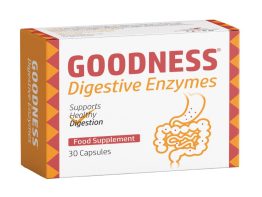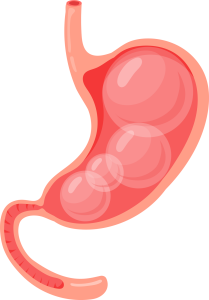Digestive enzymes play a crucial role in helping the body break down food and absorb nutrients efficiently. Whether you take them to manage digestive issues such as bloating, gas, and indigestion or to enhance nutrient absorption, knowing when to take digestive enzymes can significantly impact their effectiveness. Understanding the timing and mechanism of action behind digestive enzymes is essential for getting the most benefit.
Mechanism of Action of Digestive Enzymes in the Body
Digestive enzymes work at various stages of the digestive tract to break down food into absorbable nutrients. Here’s how they function step-by-step:
1. Ingestion and Pre-Digestion in the Mouth
- Salivary Amylase Initiation: Digestion begins in the mouth with chewing (mastication), which mechanically breaks down food, and salivary amylase, which chemically starts breaking down carbohydrates into simpler sugars like maltose.
- Importance of Chewing: Thorough chewing increases the surface area of food, enhancing enzyme effectiveness.
- Supplemental Enzymes: Taking digestive enzymes with meals can assist natural enzymes from the outset, aiding those with deficiencies or specific intolerances.
2. Stomach Digestion: Protein Breakdown
- Acidic Environment Activation: The stomach’s hydrochloric acid (HCl) creates an acidic environment that activates pepsin from pepsinogen, beginning protein digestion.
- Pepsin’s Role: Pepsin breaks proteins into smaller peptides, preparing them for further digestion in the small intestine.
- Enzyme Survival in Acidity: While some enzymes (like salivary amylase) are deactivated by stomach acid, others are designed to function in this environment. Supplements may use enteric coatings or acid-resistant enzymes to ensure effectiveness.
3. Small Intestine Absorption: Nutrient Breakdown
- Pancreatic Enzymes: The pancreas releases enzymes into the small intestine:
- Pancreatic Amylase: Continues carbohydrate digestion into simple sugars.
- Pancreatic Lipase: Breaks down fats into fatty acids and glycerol.
- Proteases (Trypsin and Chymotrypsin): Further digest proteins into amino acids.
- Nutrient Absorption:
- Carbohydrates: Absorbed as monosaccharides into the bloodstream.
- Fats: Absorbed as fatty acids and glycerol, reassembled into triglycerides and transported via the lymphatic system.
- Proteins: These are absorbed as amino acids for use in body functions.
4. Colon Fermentation and Gut Health
- Undigested Food Fermentation: If food isn’t fully digested, it reaches the colon and ferments, leading to gas, bloating, and discomfort.
- Role of Enzymes in Reducing Fermentation:
- Amylase: Ensures carbohydrates are digested, reducing gas production.
- Protease: Completes protein digestion, minimizing putrefaction and inflammation.
- Lipase: Improves fat digestion, preventing fatty discomfort.
- Specific Enzymes:
- Alpha-Galactosidase: Breaks down gas-causing fibers in legumes and vegetables.
- Lactase: Aids those with lactose intolerance by digesting lactose before it ferments.
- Benefits:
- Reduces bloating and gas.
- Prevents abdominal discomfort.
- Supports regular bowel movements.
- Promotes a healthy gut microbiome by minimizing excessive fermentation.
The Best Time to Take Digestive Enzymes
Timing is essential for digestive enzyme effectiveness. To maximize the benefits of enzyme supplements, it’s essential to take them at the optimal time based on how they work in the digestive process.
1. With Meals
The most common recommendation is to take digestive enzymes with meals or before eating. This ensures that the enzymes are present when food enters the stomach and small intestine, allowing them to break down the food components immediately. Taking enzymes with food mimics digestion, helping your body digest carbohydrates, proteins, and fats more effectively.
Why With Meals?
- Digestive enzymes, such as amylase and lipase, must simultaneously be present in the stomach and small intestine as the food breaks down.
- Taking enzymes during or right before eating ensures that they can interact with the food as it moves through your digestive tract, aiding in the breakdown process.
- For individuals with conditions like lactose intolerance or fat malabsorption, taking enzymes like lactase and lipase with meals ensures that these enzymes can act on the lactose or fat content of the meal, reducing symptoms like bloating, gas, and diarrhea.
2. Before Meals
People with bloating or gas can benefit from taking digestive enzymes 15 to 20 minutes before a meal. This gives the enzymes time to be released and mix with the food as soon as it arrives in the stomach, supporting smooth digestion.
Why Before Meals?
- Enzymes like alpha-galactosidase, which breaks down complex carbohydrates in beans and legumes, can be particularly effective before eating foods that cause gas or bloating.
- Taking digestive enzymes before eating gives your body extra support, especially for heavy or high-fat meals that may be harder to digest.
3. After Meals (in Specific Cases)
Taking digestive enzymes after meals is generally not recommended because enzymes work best when they are present as food enters the stomach. However, if you forgot to take enzymes before or during a meal and experience digestive discomfort afterward, taking an enzyme supplement after the meal may still help alleviate some symptoms, especially if you are dealing with bloating, gas, or indigestion.
Why Timing Matters
Taking digestive enzymes at the right time is critical because they need to be active in the digestive tract when food is present. If taken too early or too late, the enzymes may pass through the digestive system without interacting with the food, which limits their effectiveness. Here’s why timing is important:
- Enzymes have a limited window of activity: Digestive enzymes act only for a specific period, so they need to be present when food is being broken down.
- Acidic vs. alkaline environments: Some enzymes, such as protease, are more active in acidic environments like the stomach, while others, such as lipase, work best in the alkaline environment of the small intestine. Taking enzymes with food ensures they reach the right part of the digestive tract at the right time.
- Supporting natural enzyme production: Taking enzymes with meals enhances the body’s natural production of enzymes, ensuring optimal digestion and nutrient absorption.
How Goodness Digestive Enzymes Can Help
Goodness Digestive Enzymes enhance digestion by blending enzymes, including amylase, lipase, protease, alpha-galactosidase, and lactase. This comprehensive formulation helps break down carbohydrates, proteins, fats, and dairy, improving digestion and alleviating symptoms such as bloating, gas, and indigestion.
You can optimize their effectiveness by taking Goodness Digestive Enzymes with or just before meals. This ensures that food is broken down efficiently and nutrient absorption is maximized. The enzymes in Goodness Digestive Enzymes mimic your body’s natural digestive processes, helping to relieve common digestive issues and promoting overall gut health.
Conclusion
Digestive enzymes are essential for breaking down food and supporting healthy digestion. The best time to take digestive enzymes is with meals or just before eating, as this ensures that the enzymes are present when food enters the stomach and small intestine, allowing them to work effectively. By understanding digestive enzymes’ timing and mechanism of action, you can maximize their benefits and improve your digestive health. Goodness Digestive Enzymes provides a powerful blend of enzymes to help alleviate common digestive issues, supporting your body’s natural digestion process and promoting better nutrient absorption.
-
Product on sale
 Goodness Digestive EnzymesOriginal price was: $ 29.95.$ 25.95Current price is: $ 25.95.
Goodness Digestive EnzymesOriginal price was: $ 29.95.$ 25.95Current price is: $ 25.95.






